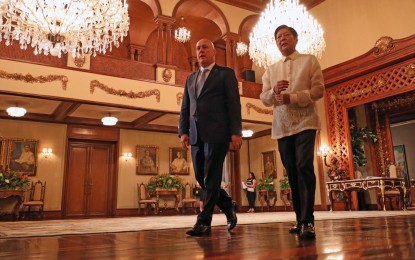
STRENGTHENING RELATIONS. President Ferdinand R. Marcos Jr. (right) welcomes visiting New Zealand Prime Minister Christopher Luxon at the Malacañang Palace in Manila on Thursday (April 18, 2024). Luxon's visit highlights the two countries’ commitment to stronger ties as they move toward the 60th commemoration of the Philippines-New Zealand bilateral relations in 2026. (Presidential Photographers Association)
MANILA – The Philippines and New Zealand have taken steps toward deeper defense cooperation, including the possible establishment of a visiting forces agreement, as President Ferdinand R. Marcos Jr. and New Zealand Prime Minister Christopher Luxon met in Malacañang on Thursday.
In a joint statement released after the two leaders’ bilateral meeting, Marcos and Luxon committed to “maintaining and strengthening defense engagements while exploring new frameworks of cooperation to deepen defense ties.”
“Both sides committed to the signing of a Mutual Logistics Supporting Arrangement (MLSA) by the end of 2024, and to concluding a Status of Visiting Forces Agreement (SOVFA),” the leaders said.
Aside from the United States, the Philippines also has a SOVFA with Australia and is currently developing a similar defense pact with Japan, known as the Reciprocal Access Agreement.
These types of military partnerships allow Filipino and foreign soldiers to train in each other’s territory, as well as share military equipment and assets.
Marcos and Luxon both shared serious concern over recent developments in the South China Sea, reaffirming the right of freedom of navigation and overflight and other lawful uses of the seas under international law, particularly the 1982 United Nations Convention on the Law of the Sea (UNCLOS).
The two leaders also expressed commitment to sustaining maritime security cooperation, including bilateral and multilateral activities at sea, port calls/visits, and capacity-building efforts.
Recognizing that the Philippines and New Zealand have a shared interest as Pacific maritime nations, Marcos and Luxon also pledged to cooperate on maritime law enforcement, including addressing common threats, such as piracy, maritime terrorism, contraband smuggling, wildlife trafficking, and irregular human migration.
Strengthening economic ties
Meanwhile, Marcos and Luxon also welcomed the development of stronger economic linkages between the Philippines and New Zealand and reaffirmed their shared commitment to upholding the rules-based trading system.
Both Leaders welcomed the upgrade of the ASEAN-Australia-New Zealand Free Trade Area (AANZFTA) and the successful implementation of the Regional Comprehensive Economic Partnership (RCEP) and acknowledged the strong collaboration between the two countries through the Asia-Pacific Economic Cooperation (APEC).
Luxon acknowledged the Philippines’ interest in developing the export capability of its agricultural sector and pledged to further discussions between officials on this initiative.
Additionally, the two leaders also committed to eliminating “unnecessary barriers to trade” and promised to ensure that exporters could fully utilize the comprehensive suite of free trade agreements, to achieve a “mutually beneficial increase of 50 percent in two-way trade by 2030.”
People-to-people exchange
Likewise, the two leaders vowed to continue strengthening people-to-people cooperation and ensure the welfare of Filipino migrant workers, especially nurses.
Marcos and Luxon looked forward to the review of the existing bilateral migrant worker arrangement, which will facilitate the recruitment of Filipino workers to New Zealand and other initiatives.
During their meeting, Marcos and Luxon also discussed the relations of the Philippines and New Zealand in terms of environment, climate change, people-to-people exchanges, and other multilateral endeavors.
Luxon is in Manila for the last leg of his three-country Southeast Asia swing. He has also visited Singapore and Thailand. (PNA)
